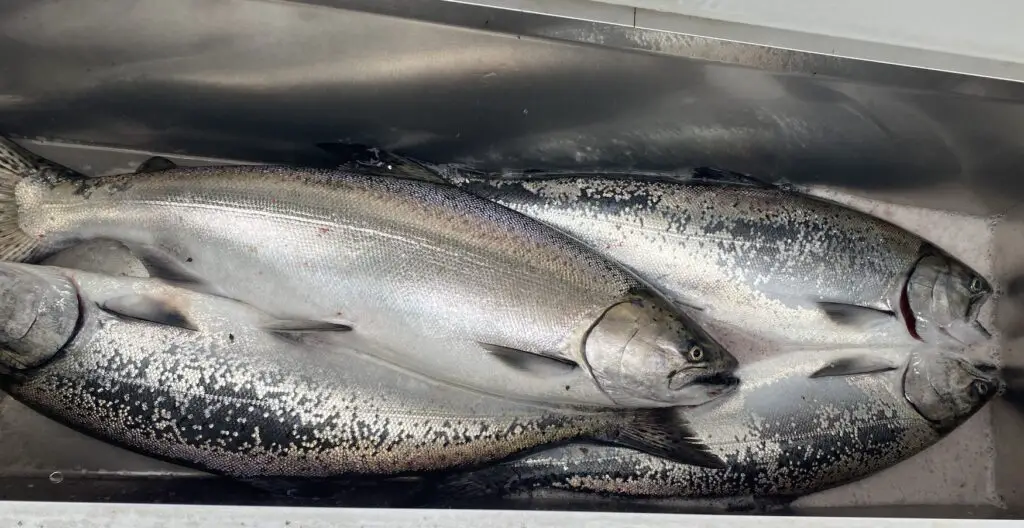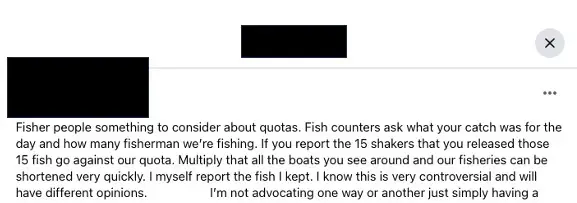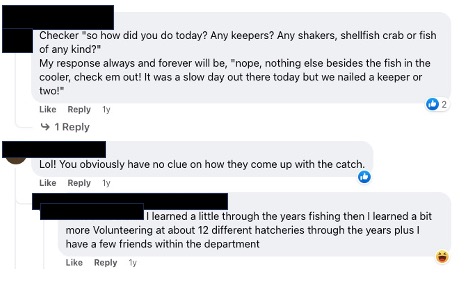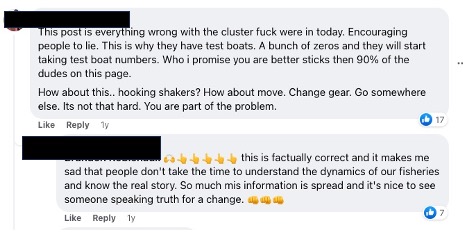
You might be thinking this is a ridiculous blog post just from the title, but it’s actually a really important question to think through with a full understanding of how our fishing and catching data is used by WDFW. By attempting to apply logic and reason to this question we will hopefully illuminate some things we may not fully understand.

Consider the above post taken from a popular social media group on the topic of fishing in Puget Sound.
For starters, the above post is not unique at all. It doesn’t take long to search the word “creel” or “checker” and find many many more just like it.
However, for those who maybe haven’t fished a creel-checked fishery, I will give you the short version of what creel-checking is about:
WDFW employs creel checkers who work for the state and meet anglers on the bank or boat ramps and ask them questions about the fish they caught and kept vs released. Creel checkers are not enforcement, so even if you show a creel checker your illegally caught salmon, they won’t give you a ticket or anything like that.
The creel check data is collected and aggregated from across the state and used in monitoring and modeling the performance of fisheries.
One of the largest factors outside of stock abundance determining whether we get to fish or not when ESA (Endangered Species Act) listed fish are potentially impacted (Puget Sound Chinook are ESA listed), is whether we have adequate monitoring of the fisheries.
The permit to fish where ESA-listed stocks are present, is a federal thing, just as the ESA is a federal thing.
So, if monitoring is a critical federal requirement and creel checking is the primary monitoring method and posts like the above and the ensuing comments like this one below are not only common but reflect the practice of enough anglers:

How do you think this plays out in the all-important negotiations between the state, tribal, and federal folks on conducting fisheries where ESA stocks are present?
It’s quite easy for someone to run test fishing alongside our sport fleet for a hypothetical fishery and hypothetically hook 10 shakers to every keeper fish and compare that data to the 1 keeper and 0 shakers per 3-rod average “reported” by the sport fleet and call BS on all of the data WDFW would rely on to monitor the sport fisheries.
For starters, the above is not hypothetical at all outside of the for illustration purposes numbers.
Can you guess what the next chapter in this saga is?
Yeah, if you’re following along or maybe you know the actual story, you absolutely can guess what happens next…
Creel checks have to now be compared to test fishing numbers because the data WDFW was relying on for that all-important “monitoring checkbox” is now considered inaccurate on the question of how many unmarked and sub-legal salmon were caught and released.
Okay, so what’s wrong with using both sets of numbers? Well, there are several problems with test fishers being required for the most credible fisheries monitoring to take place:
- Test fishers may actually be more effective than the average angler out there on the water, but their results will be applied to an independent count of “angler effort”
- Test fishers cost money! I see all these complaints about how we should raise more salmon, yet the same funding source for raising those salmon now has to pay test fishers because we thought we could get a longer season by lying to the creel checkers.

Yup, these guys get it!
I should clarify a few things here. This post is meant for the person who really wants to think this issue through. There are many anglers out there who will never read a fishing blog, won’t read mine or if they did will write it off immediately as: “That’s BS! The state sucks, blah blah blah.”
I’m hoping that the next wave of anglers getting involved here and those who have an open mind can really consider HOW we can be a positive contributor to our fisheries and seasons, vs just looking at the very short-term narrow view in front of us.
Now of course the really obvious next question will be exactly that question: If I tell the truth to the creel checkers and report every unmarked and sub-legal salmon I caught, AND our creel data becomes credible again, won’t that close our season faster?
Now some again will dismiss all of this off the bat and complain that the tribe gets to net unmarked fish, blah blah blah, I have much to say on many of these topics, but how the tribe fishes is irrelevant for this specific question and topic.
Let me answer the question above, phrased differently in the following, with several points: Won’t I be hurting my fishing season by telling the truth?
- If anglers were honest and became credible (more in line with test fishers), I believe WDFW would have more accurate data, and that data would show less impact on sub-legals and unmarked fish vs what the test-fisher-driven numbers show. I have no way to prove this of course, but my logic is that there are a lot of people who fish and catch nothing and don’t get out very often. They are the 90% who catch few and test fishers are in the 10% who catch many.
- Test fishers cost money. And we have to spend more and more money on this type of resource or we don’t get to have a sport fishery. That’s the reality of the state of fishing in Puget Sound these days, and likely soon to be the same situation on coastal steelhead at some point. There are several cases where lack of data has led to or was cited as the reason for not having a fishery.
- Even if #1 is wrong and we hurt our season by being honest…shutting a season down to lower the impact (and yes there’s a such thing as release mortality calculated as a % of released fish determined by the size of the fish) is NOT a bad thing. Yes, it sucks for that immediate season, but the way the North of Falcon process actually works and the modeling works is that those fish that don’t make it to the spawning grounds impact next year’s season.
You were hoping to fish next year too, right? Let’s say we just had bad data all around and took more than what the fishery numbers allowed for and the redd counts and outmigration counts of smolts dropped marginally as a result…do you think we are fishing for marked hatchery fish that next year or for several years afterward?
Where’s the upside of dishonesty? An immediate gratification that lasts a few weeks? Another fish picture on social media?
Many of you who have opinions on this topic are boat owners…do you like not being able to use that boat on Puget Sound for most of the year? It didn’t used to be that way! And I’m not pretending that going from dishonesty to honesty about what we released will turn things around, but for crying out loud it’s the one thing we CAN control, and there seems to be very few of those things these days.
But go ahead, if you remain unconvinced, continue as you were and play the victim card.
I know there are many who will be convinced and lean into doing their part to provide accurate reliable data that can be used to manage our fisheries in the years ahead. What if that became our reputation instead?
One of the BEST ways to do that is to start filling out a VTR (Voluntary Trip Report). Currently, there aren’t enough folks who fill these out. I just started doing it this season myself and I cannot believe how simple it is:
Just fill the online version of it, after your fishing trip, it takes like 30 seconds.
Do you have a differing opinion? Did I miss something important in this discussion? Drop me a comment below.
However you take this blog post, know that I’m going to do whatever I can to expand our opportunity and to do it sustainably because I believe in the long-term vision of the PNW Best Life and I want to keep whacking salmon and eating them until I’m very old and very gray.
I’m not going to comment on lying. But you left out several other factors… like WDFW does fly overs (on the busiest days) and uses those numbers to add what the (Professional fish testers) catch to calculate our catch rate. Not only that these professional fish testers know most successful fishermen and know where the fish are at at any given time. The fact is their numbers are not realistic for everyone. Also WDFW doesn’t do their fly overs on slow days (for example bad weather or weekdays) and uses the good days as an average for those days. My point is we are being cheated out our 50% by WDFW and the tribes. “That is no lie”. And on the subject the tribes have been trying for years to take our area 9 winter blackmouth which they were successful doing during the pandemic because we couldn’t stand up for ourselves and neither did WDFW. We should get a longer summer season without that fishery but we’re not. As a matter a fact their new scheme is 3 days a week for 3 weeks… once those fish go by they are gone! Thanks WDFW for your honest treatment of the people that pay for the privilege! Until or unless you get your facts straight, you are not advocating for fishermen.
Frank,
Thanks for taking the time to read my article and leave a comment. WDFW only conducts flyovers on 2 Puget Sound Marine Area’s to calculate total effort: 6 and 7. And this is due to their large size and difficulty in judging effort at a few main launches / ports.
Also, as someone involved in the NoF process advocating for angler opportunity, you don’t have your facts straight on losing the Marine Area 9 blackmouth opportunity.
Are you sure you should be judging my advocacy for anglers?
Have a good one.
You act like your some kind of privileged part owner of the fisheries ? dude your just a taker like most other ball baby anglers who isn’tworth diddlyto our naturalresources…the tribes put in their work for their fish they own…suck it up butter cup…maybe go back to Europe and go catch some carp and suckers..your post is just false bs with no facts..
I agree with the gentleman above. None of the info the WDFW is accurate. And you want to talk about not being honest. The tribes way over fish the runs. The rules for them have just gotten better and better as the years go on. I can remember when the tribes had to put a stake in and stretch a net and it was only half way across the river. Now they use a boat or 2 boats and drag net, raping the river. The hatcheries don’t clip the fish they say they do! Sport anglers put out more money to fish that anyone else and our seasons are being cut short. Tribes are keeping us completely out of some rivers ( Skokomish ). So, ya do I think the state is the back pocket of tribes, absolutely. I am part native Indian, and I don’t claim it. It’s shameful!
Scott,
I appreciate your reading of my article and taking time to engage. This article isn’t about the tribes which is a much more nuanced topic than what you’ve presented in your comment.
The gentlemen above demonstrated mostly ignorance on the topics he commented on, so I would challenge you to question some of the “lazy narrative” out there on WDFW, the tribes, etc.
There’s much more going “in the details” on than how it’s being represented in these comments, but I appreciate the passion and emotion on the topic.
Part native ? . must be part Cherokee princess for your straight up racist blame game for the natives…just another uneducated privileged clown…
Great article, I’ve always been suspicious of self reported data, too many people think they’re outsmarting the powers that be. Blaming the tribes is a non starter politically and legally. We could look at non tribal commercials. We outlawed market hunters 200 years ago, why are fish any different? While I’m no fan of everything the WDFW does, they’re not the enemy. I’d suggest they develope a program to recruit trusted fisherman to replace some of the creel checkers.
J Pat,
Thanks for engaging on this topic!
That’s an interesting idea for sure about “trusted anglers”, I think it starts with the VTR’s, but I will keep thinking about that in my various conversations with folks on these topics.
Ideally, the angler data adds to the creel data to best reflect reality. Most of the fisheries management stuff that’s being done is for the best interest of the long term viability of the salmon and the salmon fishing opportunity, though it’s complex and the department finds themselves in some challenging situations to manage that either weren’t foreseen or come down to lack of data or in the case of the article topic “non-credible data.”
I also think there are several head scratching decisions made, but I’m working with folks to understand and influence these things in a salmon and angler friendly direction